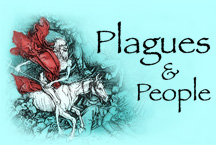In a word, all died, both those who had acute attacks and those who
had chronic, most especially from affections of the belly, for it was the
belly which carried them all off.
All persons had loss of appetite in all the afore-mentioned complaints
to a degree such as I never met with before, and persons in these complaints
most especially, and those recovering from them, and in all other diseases
of a mortal nature. Some were troubled with thirst, and some not;
and both in febrile complaints and in others no one drank unseasonably
or disobeyed injunctions.
The urine in many cases was not in proportion to the drink administered,
but greatly in excess; and the badness of the urine voided was great, for
it had not the proper thickness, nor concoction, nor purged properly; for
in many cases purgings by the bladder indicate favorably, but in the greatest
number they indicated a wasting of the body, disorder of the bowels, pains,
and an absence of crisis.
Persons laboring under phrenitis and ardent fever were particularly
disposed to coma; but also in all other great diseases which occurred along
with fever. In the main, most cases were attended either by heavy
coma, or by short and light sleep.
And many other forms of fevers were then epidemic, of tertian, of quartan,
of nocturnal, of continual, of chronic, of erratic, of fevers attended
with nausea, and of irregular fevers.
All these were attended with much disorder, for the bowels in most cases
were disordered, accompanied with shivering, sweats not of a critical character,
and with the state of the urine as described.
In most instances the disease was protracted, for neither did the deposits
which took place prove critical as in other cases; for in all complaints
and in all cases there was difficulty of crisis, want of crisis, and protraction
of the disease, but most especially in these.
A few had the crisis about the eightieth day, but in most instances
recovery followed no rule. A few of them died of dropsy without being
confined to bed. And in many other diseases people were troubled
with swelling, especially consumptives.
Consumption
The severest and most dangerous disease, and the one that proved fatal
to the greatest number, was consumption.
With many persons it began in the winter, and of these some were confined
to bed, and others bore up on foot; the most of those died early in spring
who were confined to bed; of the others, the cough left not a single person,
but it became milder through the summer; during the autumn, all these were
confined to bed, and many of them died, but in the greater number of cases
the disease was long protracted.
Most of these were suddenly attacked with these diseases, having frequent
feverish chills, often continual and acute fevers; unseasonable, copious,
and cold sweats throughout; great coldness, from which they had great difficulty
in being restored to heat; the bowels variously constipated, and again
immediately in a loose state, but towards the termination in all cases
with violent looseness of the bowels; a determination downwards of all
matters collected about the lungs; urine excessive, and not good; malignant
wasting.
The coughs throughout were frequent, and copious, digested, and liquid,
but not brought up with much pain; and even when they had some slight pain,
in all cases the purging of the matters about the lungs went on mildly.
The throats were not very irritable, nor were they troubled with any
saltish humors; but there were viscid, white, liquid, frothy, and copious
defluxions from the head.
But by far the greatest mischief attending these and the other complaints,
was the loss of appetite, as has been described. For neither had
they any relish for drink along with their food, but continued without
thirst. There was heaviness of the body, disposition to coma, in
most cases swelling, which ended in dropsy; they shivered, and were delirious
towards death.
The physical characteristics of the consumptives were -- skin smooth, whitish,
lentil-colored, reddish; blue eyes; a leucophlegmatic [white
phlegmed] condition; and shoulder blades that project like wings.
Women were affected the same as men.
Individuals with a melancholic temperament suffered principally from
phrenitic and dysenteric affections.
Tenesmus troubled young persons of a phlegmatic temperament.
Chronic diarrhea, acrid and thick stools, attacked those who were bilious.
To all those which have been described, the season of spring was their
worst enemy, proving fatal to the greatest numbers: the summer was
the most favorable to them, and the fewest died then; in autumn, and under
the Pleiades, again there died great numbers.
It appears to me, according to the reason of things, that the coming
on of summer should have done good in these cases; for winter coming on
cures the diseases of summer, and summer coming on removes the diseases
of winter. And yet the summer in question was not of itself well
constituted, for it became suddenly hot, southerly, and calm; nevertheless,
it proved beneficial by producing a change on the other constitution. |

